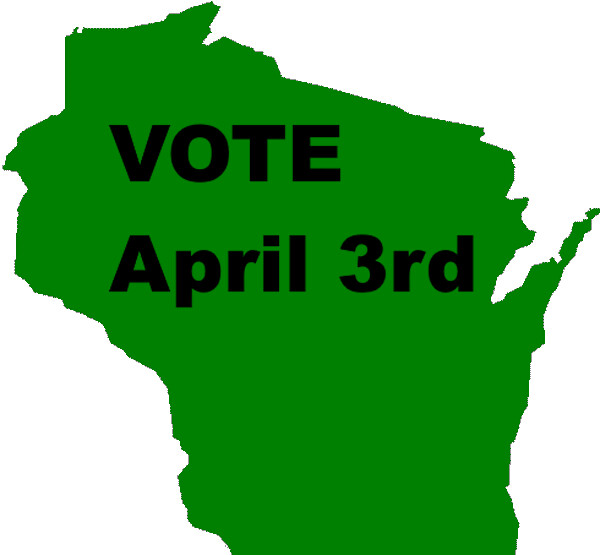News & Articles
Browse all content by date.

The April 3rd election in Wisconsin is very important. A Supreme Court justice will be elected. Spring elections often involve minor local issues and offices and these elections have very poor voter turnout. Many voters are not even aware this election is happening! As a result major decisions get decided by a very small number of citizens.
The two candidates in this race are Milwaukee County Circuit Court Judge Rebecca Dallet and Sauk County Circuit Court Judge Michael Screnock. The two candidates vary widely in experience, qualifications, and stature in the profession. Supreme Court justices serve 10 year terms and the court often makes decisions that affect all of us.
Judge Dallet is clearly the more experienced candidate. She was a prosecutor for 11 years for the Milwaukee County District Attorney and the U.S. District Attorney. She has been a Milwaukee County Circuit Court judge for 10 years. In addition, she taught law at Marquette University for three years. She has been endorsed by 220 other judges in Wisconsin plus many current and former elected officials at all levels of Wisconsin government.
Judge Screnock has only three years of experience on the Sauk County Circuit Court. He was appointed by Governor Walker to this position in 2015. He won election to the position 2016. He completed his law degree in 2006 and was hired by a large law firm specializing in representing business. While working for this firm, Screnock helped the state defend itself against the Act 10 lawsuits. He has a degree in math and an MBA in economic development. Before becoming an attorney he worked for several small Wisconsin communities in development and financial management. He is endorsed by some Wisconsin judges including the Republican justices on the Supreme Court. Republican legislators and the Lt. Governor are the endorsements prominently listed on Screnock’s campaign website.
Judge Dallet says she is running to restore “fairness and independence” to the Wisconsin Supreme Court. She says Wisconsin citizens must have confidence that the decisions of the court are not “politically motivated.” She is correct that the court has a tarnished reputation. Since 2010 the court has been in the news numerous times for controversies over treatment of women justices, conflicts of interest, failure to recuse themselves when there were conflicts of interest, and politically motivated rulings. She would like to restore the prior good reputation of the court.
Judge Schenock is running on having a conservative judicial philosophy. He has said “The role of a judge or justice is to interpret and apply the law, not rewrite the law.” He speaks about not “legislating from the bench.” These are standard conservative talking points. Conservatives claim to apply the “original intent” of the law in deciding cases and not personal opinions. They accuse “liberal” judges of creating new laws or “legislating” with their decisions. These simplistic soundbites make great attack ads but show a misunderstanding of the judicial process.
The work of judges involves interpreting and applying the law (or contradictory laws) to a specific case. Extenuating circumstances, motives, contradictory testimony, and specific facts must be considered. Fair, consistent resolution of cases require more than “saying what the law is.” These considerations require judgment calls by judges that do create law (called case law) and establish consistent application of law (called precedents). Over time as society, community standards, and technology changes, these rulings adapt the law to new situations. This is the normal process of courts and is necessary for justice.
Obviously all judges, like other politicians, are shaped by their backgrounds and beliefs. Conservative judges bring their personal and political bias to cases as do other judges. This is why we elect judges. Elected judges are supposedly more accountable to the public and less beholden to political, business, or other special interests. Elections avoid the favoritism and corruption of appointing judges. If they are elected by “the people” they won’t be “bought” so easily. This ideal, of course, isn’t always reality. Experience has shown that the method of choosing judges has little to do with their honestly or impartiality. It is a fallacy to think politics is not involved in selecting judges regardless of how it is done.
Contrary to conservative talking points, our courts have more often exhibited conservative than liberal bias. Historical cases prove this statement. Slaves were property to be returned to owners. Unions were conspiracies against trade. Separate but equal was good enough for black children. Property was more important than people. More recently, corporations are people, money is free speech, and voting restrictions are constitutional. In Wisconsin and nationally, long established interpretations of law have recently been reversed because of political changes in court majorities. Both the U.S. and Wisconsin supreme courts are dominated by conservatives and their rulings reflect this bias.
So voters should be concerned with the political views of potential judges. Rather than unrealistically hoping for impartial judges, voters should look at who the candidates are, what they believe, and who supports them. Judges are influenced by the political environment and the political process, especially campaign contributions. It is unrealistic to think judges are not human. Judges, like all politicians, are going to “dance with him who brung ‘em.”
Judge Screnock is clearly is dancing with the Republicans. This is proven by the fact of Walker’s appointment, his defending Walker’s policies in court, who is endorsing him, and the record of campaign contributions. His campaign reported receiving $111,100 from the Republican Party of Wisconsin. This is half of his total contributions. Dallet reported receiving no money from the Democratic party. Clearly Screnock’s only “qualifications” are his judicial philosophy and close connections with Walker.
Voters need to understand that a Supreme Court justice is not an entry level position. Judge Dallet is clearly the better candidate.
| Tweet |


